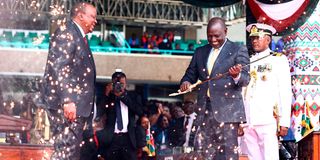Transition is serious business

President William Ruto holds a sword received from former Commander in Chief of the Kenya Defence Forces Uhuru Kenyatta at Moi International Sports Centre, Kasarani, on September 13, 2022.
What you need to know:
- Over half of Africa’s 54 countries have either not had a peaceful transition through a vote or from an incumbent party or leader to the opposition.
- It can often go horribly wrong, and there is no shortage of examples of the disaster in Africa.
- In our lands, power can be slippery. You cannot sleep easily until you have it firmly between your teeth.
On Tuesday, after the disputes and the Supreme Court ruling, William Ruto was sworn in as the fifth President of Kenya.
Many observers hold that it was just the drama of democracy playing out.
Many opined that Kenya shouldn’t take for granted its third transition to a different party leader after elections in 20 years.
They have a point. If you look at the data, over half of Africa’s 54 countries have either not had a peaceful transition through a vote or from an incumbent party or leader to the opposition.
It can often go horribly wrong, and there is no shortage of examples of the disaster in Africa.
On December 1, 2016, The Gambia went to the polls. Military ruler Yahya Jammeh, in power for 22 years and having won all previous elections, was resoundingly beaten by rival Adama Barrow.
A week after accepting the results, Jammeh had a change of heart and rejected them. He refused to hand over power and called for a new vote.
A stand-off ensued. The West African regional bloc Ecowas told Jammeh to let the duly elected Barrow take over.
They gave him an ultimatum to leave and warned him they would send in an Ecowas force to eject him if he didn’t.
A stubborn Jammeh held his ground. The Ecowas troops came in, Jammeh’s loyalists folded like a cheap suit and, on the evening of January 21, 2017, he was bundled on a plane to begin his exile in Equatorial Guinea.
Jammeh should have learnt from a decisive and ruthless Robert Mugabe eight years earlier.
Zimbabwe went to the polls in late April 2008. Leader of Zanu-PF, the man who had been in power for 28 years, faced off against Morgan Tsvangirai of the Movement for Democratic Change (MDC).
When it became clear he was losing, Mugabe warned the Zimbabwe Electoral Commission (ZEC) not to announce the results.
On May 2, they did, declaring that Tsvangirai had won 47.9 per cent of the vote as Mugabe managed 43.2 per cent, necessitating a run-off as neither had got more than 50 per cent.
The run-off was scheduled for June 27, 2008. Mugabe, who vowed “never to surrender”, took care of business, unleashing one of the most violent crackdowns against the opposition in the run-up to an election that Africa had witnessed in a long time.
Bruised and in plaster, with thousands of supporters killed, jailed or maimed, Tsvangirai withdrew from the run-off, leaving Mugabe to cruise to what would turn out to be a disastrous end for him in 2017.
Messy, bloody
In October 2010, another presidential election that turned out to be very messy and bloody was held in restless Côte d’Ivoire.
Incumbent Laurent Gbagbo faced 14 rivals, the main ones being former leader Henri Konan Bédié and Alassane Ouattara, a former IMF bureaucrat and prime minister and IMF official.
In the first round, no candidate garnered a majority of more than 50 per cent, with Gbagbo winning 38 per cent of the vote and Ouattara 32 per cent. On November 28, 2010, they tangled in the second round.
The Independent Election Commission (CEI) declared Ouattara the winner with 54.1 per cent as Gbagbo garnered 45.9 per cent.
Gbagbo rejected the result and a friendly president of the Constitutional Council declared the results invalid.
The international community, Ecowas and the African Union recognised Ouattara as the duly elected president and both men staked out their rival claims.
War erupted again, with most of the world on Ouattara’s side. Gbagbo fought on but, by April 2011, he was corned.
His forces diminished, and holding out in the dungeon of State House with his wife Simone Ehivet Gbagbo, they were smoked out and paraded in disgrace.
He had a soiled vest and his wife’s braids had been ripped off, leaving her head miserably patched.
We are torn between the fortunes of Republic of Congo President Denis Sassou Nguesso after he lost elections in 1992 and the events in the island nation of Madagascar between 2001 and 2002.
The Congo story deserves to stand alone, the short of it is that a defeated Nguesso eventually came back to power in 1997 at the head of his “Cobra” militia, ousting the democratically elected President Pascal Lissouba and his allied “Ninja” militia.
Madagascar held presidential elections on December 16, 2001.
Neither incumbent President Didier Ratsiraka nor his main rival Marc Ravalomanana won more than 50 per cent of the vote.
As the election commission fidgeted with what to do, Ravalomanana rejected the results and declared himself president in February 2002.
Violence broke out between their supporters. After a recount, Ravalomanana was declared the winner with 51.46 per cent of the vote. In April, the High Court upheld the result.
Ratsiraka rejected the verdict, but with the international community recognising Ravalomanana, an under-siege Ratsiraka fled into exile in June.
In our lands, power can be slippery. You cannot sleep easily until you have it firmly between your teeth.
Mr Onyango-Obbo is a journalist, writer and curator of the “Wall of Great Africans”. @cobbo3





